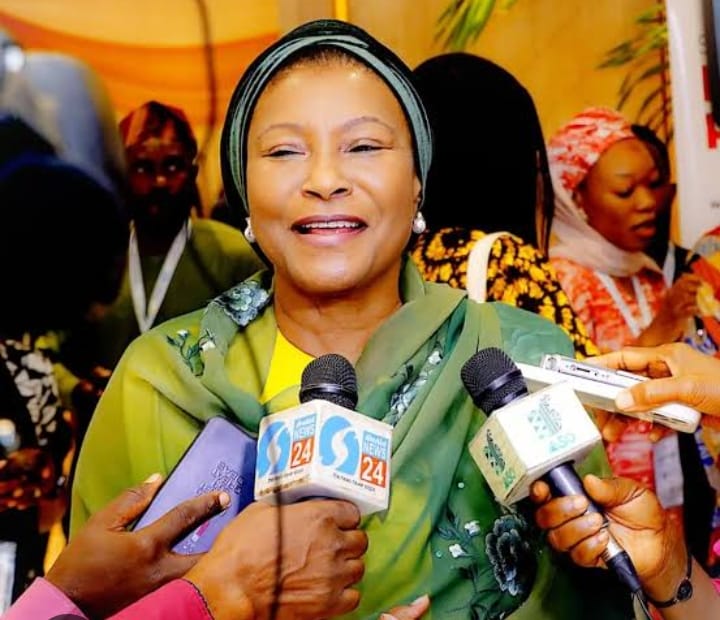Senator Ireti Kingibe of the Labour Party has rejected the National Assembly’s use of a voice vote.
Diaspora digital media (DDM) She declared the process unconstitutional and unacceptable, questioning its legitimacy in approving the state of emergency in Rivers State.
Kingibe, who represents the Federal Capital Territory, has been vocal about legislative transparency and adherence to constitutional provisions.
She argued that a critical national decision requires a recorded vote, not the subjective “Aye” or “Nay” method used.
According to her, Section 305 of Nigeria’s 1999 Constitution mandates a two-thirds majority for ratifying a state of emergency.
The approval of President Bola Ahmed Tinubu’s declaration of emergency rule in Rivers State has sparked controversy nationwide.
On Thursday, March 20, the National Assembly approved the suspension of Governor Siminalayi Fubara and other elected officials.
Both the Senate and House of Representatives used a voice vote to affirm the president’s emergency rule declaration.
Video evidence showed lawmakers approving the appointment of a sole administrator to oversee Rivers State during the emergency period.
The decision has raised concerns about the democratic implications of removing elected officials without a detailed voting record.
Additionally, the Senate mandated that all regulations in Rivers State be subject to the National Assembly Joint Ad-hoc Committee.
This move effectively placed the state government under federal legislative oversight, raising constitutional and governance concerns.
Critics argue that such actions weaken Nigeria’s federal structure and violate democratic principles enshrined in the constitution.
Alongside the emergency rule approval, the Senate urged the federal government to establish a reconciliation framework.
The proposed framework includes forming a peace and reconciliation committee to address political tensions in Rivers State.
Members of the committee would include representatives from the National Assembly, the executive branch, and other relevant stakeholders.
The committee’s objective is to promote lasting peace and stability in the crisis-ridden state through dialogue and negotiation.
Despite these initiatives, concerns persist over the legality and transparency of the approval process.
The Senate debated the state of emergency behind closed doors, preventing Nigerians from witnessing the proceedings.
This lack of transparency fueled speculation about whether proper procedures were followed in approving the emergency declaration.
Senator Kingibe strongly objected to the use of a voice vote instead of a verifiable roll call.
She argued that without an electronic voting system, there is no proof that the required supermajority was met.
“A voice vote cannot determine a two-thirds majority,” she stated, emphasizing the importance of legislative accountability.
Kingibe warned that bypassing due process weakens Nigeria’s democratic institutions and sets a dangerous precedent.
She insisted that lawmakers must scrutinize the president’s decisions rather than rubber-stamping them without proper debate.
Her stance has intensified debates about legislative transparency and the need for recorded voting on critical national issues.
Several civil society organizations and opposition politicians have echoed her concerns about the approval process.
Legal experts argue that the absence of a recorded vote could render the emergency rule approval unconstitutional.
If challenged in court, the decision could be overturned due to procedural irregularities and constitutional violations.
Kingibe called on Nigerians to demand accountability from their representatives regarding the Rivers State crisis.
She stressed that lawmakers must prioritize transparency and uphold their responsibility to the electorate.
The controversy surrounding the state of emergency has drawn reactions from various political and legal experts.
Some analysts believe the move was politically motivated, aimed at consolidating federal control over Rivers State.
Others argue that the situation could escalate tensions between the federal and state governments.
Political observers warn that this decision could set a dangerous precedent for federal intervention in state governance.
If unchecked, such actions may erode the autonomy of state governments and undermine democratic governance in Nigeria.
The situation in Rivers State remains uncertain as citizens and political stakeholders await further developments.
Many question how the emergency rule will be implemented and whether it will resolve or worsen the crisis.
Governor Fubara’s supporters have condemned the suspension, calling it an illegal attempt to undermine his administration.
Some legal experts argue that the National Assembly lacked the constitutional authority to suspend elected officials.
They insist that any action affecting a state government must follow due process and constitutional guidelines.
Kingibe’s rejection of the voice vote has sparked a broader debate on legislative integrity in Nigeria.
Many Nigerians have expressed concerns over the growing trend of executive influence on legislative decisions.
The call for electronic voting and roll-call procedures in the National Assembly has gained renewed momentum.
Advocates believe that transparency in legislative voting is crucial for strengthening Nigeria’s democracy.
Opposition lawmakers and activists are demanding a review of the emergency rule approval process.
The issue has also reignited discussions on the need for judicial intervention in cases of constitutional violations.
Legal challenges may arise as affected parties seek redress through the courts.
The judiciary’s role in upholding constitutional principles will be crucial in determining the validity of the emergency rule.
Kingibe’s firm stance has positioned her as a leading advocate for democratic accountability in Nigeria.
Her call for transparency resonates with citizens who demand a more open and accountable legislative process.
As public outcry grows, the National Assembly faces pressure to reconsider its approach to emergency declarations.
The controversy highlights the importance of legislative independence and adherence to constitutional procedures.
Moving forward, political analysts suggest that Nigeria must strengthen its democratic institutions to prevent future constitutional crises.
Ensuring that legislative decisions reflect the will of the people remains a fundamental aspect of democratic governance.
For now, the fate of Rivers State hangs in the balance as legal and political battles unfold.
Senator Kingibe remains unwavering in her demand for a more transparent and constitutional approach to governance.
Her opposition to the voice vote serves as a reminder that democracy thrives on accountability and due process.







